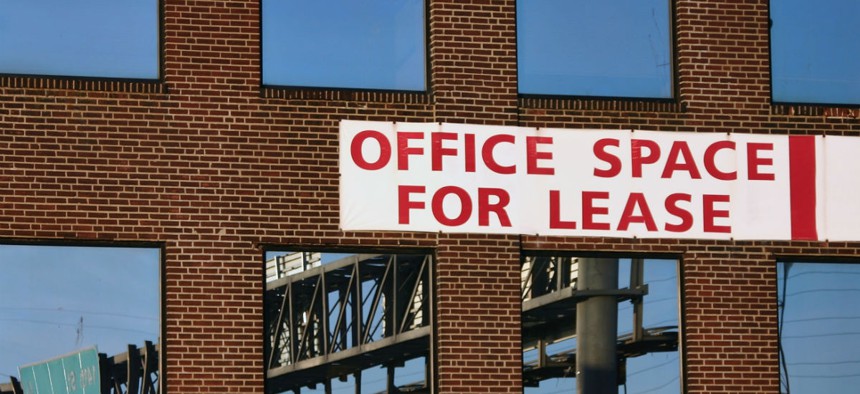
planet5D LLC / Shutterstock.com
GSA Can Improve Measures for Curbing Costly Property Leases, GAO Says
Uncertainty of "holdovers" hinders space planning by agencies and private owners.
In its continuing efforts to freeze and eventually shrink “the federal footprint,” the General Services Administration too often resorts to extending costly leases on buildings that house federal agencies, in part because it lacks meaningful performance goals, a watchdog found.
From 2012 through 2014, leases in holdover or extension status represented 27 percent of the Public Buildings Service’s overall portfolio, the Government Accountability Office said in a report released Wednesday. Fifty-four percent of the long-term leases set to expire over this time period—totaling 1,455 leases—were recently held over or extended.
“The short-term nature of holdovers and extensions creates uncertainty for tenant agencies and lessors; such uncertainty can make it challenging for federal tenant agencies to effectively plan and budget for the long term,” said auditors in a report to members of the Senate Homeland Security and Governmental Affairs Committee.
“For private lessors, the uncertainty caused by lease holdovers and extensions may hinder opportunities to secure other long-term tenants or sell a property due to the short-term nature of the tenancy,” GAO said. “Lessors may also face challenges securing financing for properties in holdover or extension.”
Overreliance on leasing remains a problem on GAO’s high-risk list, the report noted, at a time when more than half of all current leases will expire in the next five years. Many believe the government saves money when it owns vital properties.
Just three tenant agencies—the Homeland Security Department, the Justice Department and the Social Security Administration--accounted for about half the holdovers and extensions, as well as about half the overall buildings portfolio, the report noted.
In reviewing 10 sample leases in detail over the past year and interviewing GSA managers, GAO found that GSA’s efforts to make a decision on the need to lease rather than own bump into several obstacles, among them difficulty in finalizing agency spare requirements and a leasing process that is lengthy. Planners also fall back on extensions as a temporary strategic tool while consolidating space.
Another challenge is staffing shortages. The PBS workforce of 5,502 full-time employees shrunk by 16 percent from 2012-2014, and the number of lease contracting officers fell from 811 in 1995 to 201 last year.
The auditors credited GSA with initiatives to improve lease planning to get an earlier start and communicate better with agencies on their needs. But the agencies’ goals, targets and success measures for curbing costly leases lack specifics, the report said. “Specific, relevant goals and targets related to what happens to GSA's leases when they expire and expected outcomes could provide GSA with valuable information to identify any actions needed to support its ongoing efforts, and allow for greater transparency and accountability to GSA's stakeholders,” the watchdog advised.
GAO recommended that GSA identify performance goals and targets for measures related to the use of holdovers and extensions for expiring leases that take into account the frequency with which holdovers and extensions occur and GSA's expected outcomes for expiring leases.
The agency agreed with the recommendation.
(Image via planet5D LLC / Shutterstock.com)







